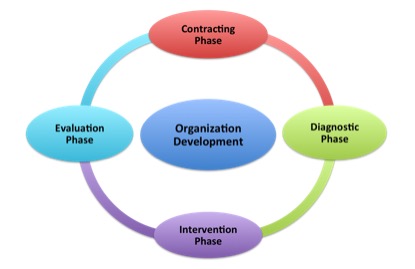The OD Cycle
There are three basic components of OD Programmes
- Diagnosis – Continuous collection of data about the total system, its subunits, its processes, and its culture.
- Action – all activities and interventions are designed to improve the organisational functioning
- Programme Management – All activities must be designed to ensure the success of the programme.
The OD Cycle
Contracting Phase
This initial phase is a necessary part of every OD project, although the process and formality vary considerably, depending on the situation. These initial steps involve a preliminary exploration of the organization’s problems and issues, plus developing a collaborative relationship between the OD Practitioner and key members of the client organization regarding how to work on those issues.
Diagnostic Phase
The Diagnostic phase of organization Development covers the second stage of the OD consultancy cycle. It’s primary aim to provide the organizational leadership and the OD practitioner with data, and a clear basis for decisions regarding what OD interventions are appropriate going forward.
Intervention Phase
Once the diagnostic phase is complete and the OD practitioner and organizational leaders have completed an analysis of the current reality within the organization it is time to begin work on understanding what steps should be taken to enable to organization to achieve sustainable organizational performance.
Evaluation Phase
The process of assessing the extent to which the organization Development intervention has delivered the outcomes that the organization required is the evaluation phase. The metrics used should have been identified and agreed prior to the intervention taking place. The evaluation phase is essential in understanding whether there has been a ROI from the OD intervention, the effectiveness of the work done and ensuring that value has been delivered to the organization in achieving sustainable organizational performance.


